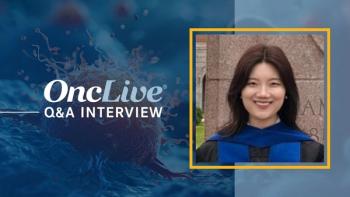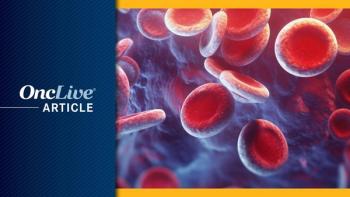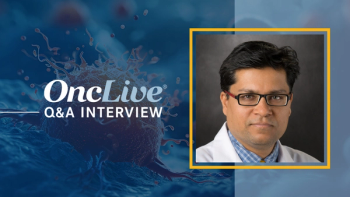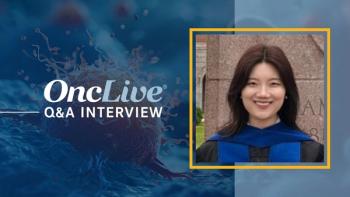
Ibrutinib Improves Outcomes in Younger Patients With Early-Relapse MCL
Carlo Visco, MD, discusses the results from the MANTLE-FIRST trial and the next steps for the research.
The administration of the BTK inhibitor ibrutinib (Imbruvica) in patients with mantle cell lymphoma (MCL) who have experienced early disease progression (POD) resulted in improved outcomes compared with bendamustine-based regimens, according to Carlo Visco, MD.
In the MANTLE-FIRST study, investigators evaluated outcomes in patients with MCL who were in first relapse following up-front treatment with high-dose cytarabine and standard regimens. A total of 261 younger patients with relapsed/refractory disease were included in the analysis. Second-line treatment regimens included rituximab (Rituxan)/bendamustine (21%), rituximab/bendamustine plus cytarabine (R-BAC; 29%), and ibrutinib (19%), among others (31%).
When adjusting for age and early/late-POD, results showed that patients who received R-BAC had a significantly higher rate of complete remission (CR), at 63%, versus the other approaches analyzed. Overall, ibrutinib and R-BAC were linked with improved median progression-free survival–2, at 24 months and 25 months, respectively, versus 13 months with rituximab/bendamustine and 7 months with other regimens.
Moreover, in the subset of patients with early-POD (n = 127), ibrutinib was linked with inferior risk of death versus the other regimens (HR, 2.41 for rituximab/bendamustine; HR, 2.17 for others; and HR, 2.78 for R-BAC). In those with late-POD (n = 134), no statistically significant differences were reported between the ibrutinib and bendamustine-based approaches.
“The take-home message is that the earlier you give the BTK inhibitor, which was ibrutinib in this case, the better it was for the patient,” said Visco. “This translated to a better survival for younger, first-relapse patients who were treated with ibrutinib alone compared with bendamustine-based chemoimmunotherapy or with other agents.”
However, this did not hold true for late-relapsed patients, added Visco; these patients have a favorable prognosis irrespective of treatment with either ibrutinib or bendamustine-based immunochemotherapy. “This is a question that remains open. The follow-up was not that long for late-relapse patients to allow for adequate comparison and for [the observation of] statistically significant differences between ibrutinib and bendamustine-based regimens,” said Visco. “This will be the topic for a future a study.”
In an interview with OncLive, Visco, an associate professor within the Department of Medicine, Section of Hematology at the University of Verona, further discussed the results from the MANTLE-FIRST trial and the next steps for the research.
OncLive: Could you start off by speaking to the unmet need faced by younger patients with relapsed MCL?
Visco: The reason for conducting the MANTLE-FIRST trial was initially based on the fact that clinicians didn't know what to do whenever younger patients with MCL relapsed. MCL is a difficult disease to treat, but it's very standardized in the first-line setting, which means that clinicians know exactly what to do when they see a patient with the disease, whether they are younger or older. However, [we] are not as clear [on what to do] when patients relapse, and [almost] all patients will relapse. This continues to be an open question. This is an unmet need; we need to understand what the best second-line therapy is for this subset of patients.
In MANTLE-FIRST, investigators specifically analyzed younger patients, who receive the same induction more or less, including rituximab and high-dose cytarabine followed by autologous transplant. Before these results came out, it was quite unknown as to which was the best or preferred therapy to be given in the second-line setting.
Several second-line regimens were evaluated in the MANTLE-FIRST study, including rituximab/bendamustine, rituximab/bendamustine plus cytarabine, and ibrutinib. Did you find that any of these regimens showed superiority over the other?
The most important observation we had—and this was also recently done by our group in another paper published in the British Journal of Hematology—was defining the time to relapse, which is very crucial to know. We divided patients who are early-progressors (POD), so the patients who are refractory to standard induction or relapse or progress within 2 years from their lymphoma diagnosis. [The 2 cohorts consisted of] patients with early POD and those who relapse later on, so up to 2 years. These 2 populations are very different in terms of survival. Those with early relapse typically have a median overall survival (OS) that is around 2 years from the time of relapse while those with late relapse has a life expectancy that is much longer, around 5 years or more.
The main results of MANTLE-FIRST were that when we divided patients between early or late relapse—keeping in mind that those with early relapse are the real unmet need—we found that ibrutinib compared with standard chemoimmunotherapy, was better in terms of survival; this approach conferred a PFS and OS advantage when given in the second-line setting.
These [findings] were not so easy to understand because everyone would ask me for second opinions in Italy and Europe on whether ibrutinib should be given early or late. Should ibrutinib be kept for third relapse, or bendamustine for second relapse? This was really questioned, and the study really answers this.
What are the next steps planned for this research?
There are at least 2 next steps for this research: 1 is biological because we will need to understand why these patients do worse than others, why some patients relapse so early once they're [treated with] ibrutinib or cytarabine or rituximab. We also need to analyze the biology of these tumors with TP53 mutations, going into deep gene sequencing and mutational status. This study has been sponsored by Fondazione Italiana Linfomi (FIL), because 90% of the patients were enrolled in Italy through this foundation. The FIL has sponsored this study, called the MANTLE-FIRST-FIL, with a grant to investigate these biological points. This is the first step.
The second step is the late-relapse [setting]—a late POD study—which I'm going to run with other colleagues in Europe and within the field, as well. This will conducted probably next year when the follow-up for these patients is longer and we will have more mature data to analyze what happens in the late-POD setting.
What is your take-home message regarding this research?
Ibrutinib improves outcomes of early-POD patients. If you choose chemotherapy because you cannot give ibrutinib for some reason, use a bendamustine-based [treatment]. It's even better if it's used in combination with rituximab and cytarabine. But use bendamustine because all other chemotherapy options have shown to be significantly inferior in all patients, with early and late relapse, both in terms of PFS and OS.
Lastly, when [a patient] progresses on ibrutinib, so in the third-line setting, R-BAC is a good option; there are some papers saying that and we confirmed this observation. The new algorithm becomes high-dose cytarabine with autologous transplant in the first-line setting. If a patient relapses early, give ibrutinib. When they relapse, go to R-BAC, allogenic transplant, and CAR T-cell therapy.
There are a plethora of chemoimmunotherapy regimens, such as, rituximab, dexamethasone, cytarabine, cisplatin (R-DHAP); apolipoprotein (ApoC); dexamethasone, high-dose cytarabine, and oxaliplatin (DHAOx), based on oxaliplatin, bortezomib (Velcade), lenalidomide (Revlimid), or fludarabine. Altogether, in our paper, we demonstrated [these regimens] to be inferior to a bendamustine-based regimen.
Reference
- Visco C, Di Rocco A, Evangelista A, et al. Outcomes in first relapsed-refractory younger patients with mantle cell lymphoma: results from the MANTLE-FIRST study. Leukemia. Published online August 11, 2020. doi:10.1038/s41375-020-01013-3





































